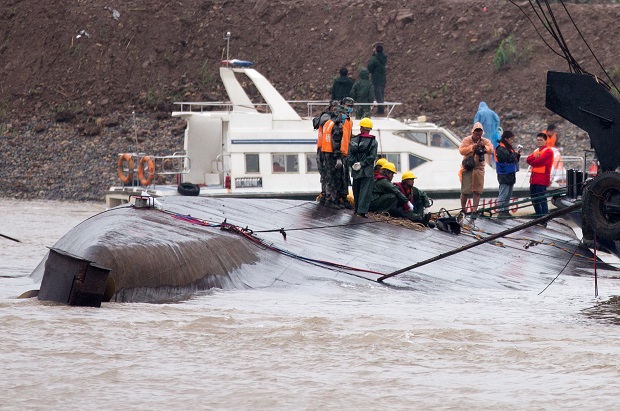65 dead in capsized Chinese ship, with more than 370 missing

Chinese soldiers stand as rescuers conduct a search and rescue operation on the capsized ship, center, on the Yangtze River in central China’s Hubei province Wednesday, June 3, 2015. Hopes dimmed Wednesday for rescuing more than 400 people still trapped in a capsized river cruise ship that overturned in stormy weather, as hundreds of rescuers searched the Yangtze River site in what could become the deadliest Chinese maritime accident in decades. AP
JIANLI, China (AP) — Rescuers cut three holes into the overturned hull of a river cruise ship in unsuccessful attempts to find more survivors Thursday as the death toll in the Yangtze River disaster reached 65. More than 370 people remain missing and are feared dead.
Chinese state broadcaster CCTV said rescuers stabilized the ship with cranes and then cut into sections of the hull, which jutted above the river’s gray currents, to check for survivors before welding the sections back to the hull to preserve the ship’s buoyancy and balance.
So far, authorities say at least 14 people survived Monday night’s sudden capsizing in a severe storm, some by jumping from the ship during the early moments and swimming or drifting ashore. Three of them were pulled by divers from air pockets inside the overturned hull Tuesday after rescuers heard yells for help coming from inside.
The lack of further survivors detected when the hull sections were opened Thursday seemed to show there was no more chance of finding anyone alive in the boat, although Chinese officials have not yet declared the search over at the accident site at the Hubei Province county of Jianli.
Meanwhile, more than 200 divers were working underwater in three shifts to search the ship’s cabins one by one, the broadcaster said. Rescuers pulled out 39 drowned passengers Thursday, bringing the toll to 65.
Article continues after this advertisementBodies were being brought to the Jianli’s Rongcheng Crematorium, where at least two relatives of passengers arrived Thursday to try to identify loved ones. One of them, a woman from the northeastern city of Tianjin who identified herself only by her surname, Zhang, said her mother was aboard the boat. She said authorities told her viewings would not be arranged until later.
Article continues after this advertisement“Mom was a wonderful person. She didn’t deserve to die like this,” Zhang said.
The Eastern Star capsizing will likely become the country’s deadliest boat disaster in seven decades, and Chinese authorities have launched a high-profile response that has included sending Premier Li Keqiang to the accident site, while tightly controlling media coverage.
Many of the more than 450 people on board the multi-decked, 251-foot-long (77-meter-long) Eastern Star were elderly taking in the scenic vistas of the Yangtze on a cruise from Nanjing to the southwestern city of Chongqing.
The survivors included the ship’s captain and chief engineer, both of whom have been taken into police custody. Some relatives have questioned whether the captain should have brought the ship ashore at the first signs of a storm, and whether everything possible was done to ensure the safety of the passengers after the accident. They have demanded help from officials in Nanjing and Shanghai in unruly scenes that have drawn a heavy police response.
Records from a maritime agency show the capsized ship was cited for safety violations two years ago. Authorities in Nanjing held the ship and five other Yangtze cruise vessels after it found them violating standards during a safety inspection campaign in 2013, according to a report on the city’s Maritime Safety website. It didn’t specify the Eastern Star’s violations.
The shallow-draft boat, which was not designed to withstand as heavy winds as an ocean-going vessel can, overturned in what Chinese weather authorities have called a cyclone with winds up to 80 mph (130 kph). The sudden capsizing meant many passengers were unable to grab life jackets, Zhong Shoudao, president of the Chongqing Boat Design Institute, said at a news conference Wednesday.
Access to the accident site was blocked by police and paramilitary troops stationed along the Yangtze embankment.
China’s deadliest maritime disaster in recent decades was when the Dashun ferry caught fire and capsized off Shandong province in November 1999, killing about 280.
With 65 dead and more than 370 people still missing, the Eastern Star disaster could become China’s deadliest since the sinking of the SS Kiangya off Shanghai in 1948, which is believed to have killed anywhere from 2,750 to nearly 4,000 people.